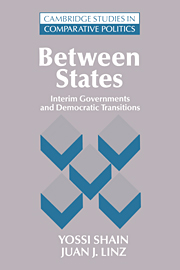Book contents
- Frontmatter
- Contents
- Preface
- Contributors
- PART ONE THEORY
- Introduction
- 1 Provisional governments: Revolutionaries and moderates
- 2 The power-sharing model
- 3 The caretaker government model
- 4 The international interim government model revisited
- 5 The timing and nature of first democratic elections
- 6 Conclusions
- PART TWO CASE STUDIES
- Index
4 - The international interim government model revisited
Published online by Cambridge University Press: 05 August 2012
- Frontmatter
- Contents
- Preface
- Contributors
- PART ONE THEORY
- Introduction
- 1 Provisional governments: Revolutionaries and moderates
- 2 The power-sharing model
- 3 The caretaker government model
- 4 The international interim government model revisited
- 5 The timing and nature of first democratic elections
- 6 Conclusions
- PART TWO CASE STUDIES
- Index
Summary
The three aforementioned models – provisional, power-sharing, and caretaker governments – have described situations in which oppositions or incumbents are vying for state power. In all these cases, regardless of the final outcome – democratic or nondemocratic – we have witnessed a hiatus or, at least, a diminution in hostilities which made possible the emergence of a new regime. In this section, we are concerned with cases where deep-seated historical rivalries are so profound, so violent, and so seemingly irresolvable that the construction of an interim regime with the potential for creating real long-term stability is minimal. This is so despite the fact that the contending factions by and large do not dispute the legitimacy of the state; they are not typically irredentists or secessionists though they may still contest the rights of certain groups to be included in the demos.
These conflicts are further exacerbated by the strong influence and sometimes actual physical presence of foreign powers which may view certain peaceful solutions as inimical to their interests. The political and socioeconomic rivalries among aspirants for power in these instances may be so intense that they preclude the possibility of the acceptance of an incumbent leading the transition as a caretaker, a complete victory of an opposition group that installs a provisional government, or the creation of power-sharing interim rule among the rivals for power. This impasse may be reinforced by the very high level of accumulation of weapons which are dispersed widely without any faction having a clearcut ability to exert a monopoly over them.
- Type
- Chapter
- Information
- Between StatesInterim Governments in Democratic Transitions, pp. 63 - 75Publisher: Cambridge University PressPrint publication year: 1995

